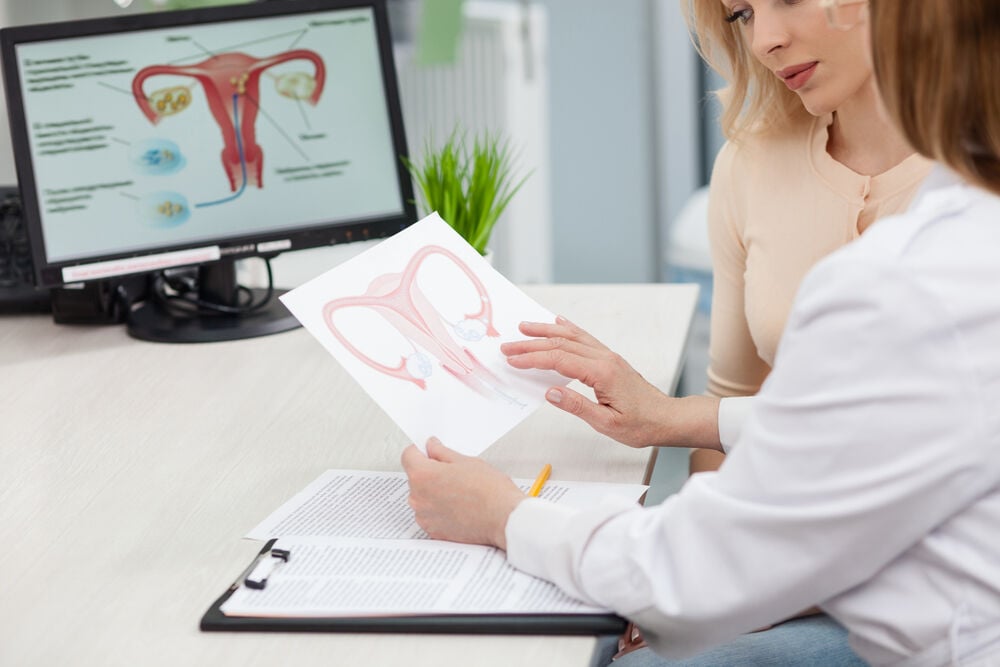If you’ve decided that you want to try to conceive, learning more about how fertility works can help you achieve your goal faster. Additionally, knowing your fertility can also help you avoid unintended pregnancies, letting you take control of your reproductive health. This can also make it easier for you to enjoy sex without worries. Read on to discover the answer to some of the most common fertility questions!
-
Tracking cycle
-
Getting pregnant
-
Pregnancy
-
Help Center
-
Flo for Partners
-
Anonymous Mode
-
Flo app reviews
-
Flo Premium New
-
Secret Chats New
-
Symptom Checker New
-
Your cycle
-
Health 360°
-
Getting pregnant
-
Pregnancy
-
Being a mom
-
LGBTQ+
-
Quizzes
-
Ovulation calculator
-
hCG calculator
-
Pregnancy test calculator
-
Menstrual cycle calculator
-
Period calculator
-
Implantation calculator
-
Pregnancy weeks to months calculator
-
Pregnancy due date calculator
-
IVF and FET due date calculator
-
Due date calculator by ultrasound
-
Medical Affairs
-
Science & Research
-
Pass It On Project New
-
Privacy Portal
-
Press Center
-
Flo Accuracy
-
Careers
-
Contact Us
Top 10 Questions About Fertility Answered


Every piece of content at Flo Health adheres to the highest editorial standards for language, style, and medical accuracy. To learn what we do to deliver the best health and lifestyle insights to you, check out our content review principles.
What does fertility mean?
Female fertility is defined as a woman’s ability to conceive and bear children. The concept of fertility is closely related to fecundity, but these terms refer to different things. Fecundity is the physiological potential for reproduction, which can depend on age, health, and willingness to conceive.
Fertility, on the other hand, refers to the actual ability to produce offspring. Unlike fecundity, fertility can be statistically measured through fertility rates.
When does a woman become fertile?
Every woman’s fertility begins at a different age. The term menarche refers to a girl’s first menstruation, which is usually accepted as the moment when they become fertile. For most girls, menarche happens when they’re around 12 to 13 years old, but it can happen before or after that age.
The timing of a girl’s menarche can be influenced by genetics, environmental factors, and especially nutrition. Menarche is often delayed in gymnasts, distance runners, and ballet dancers.
Some theories propose that this is due to an insufficient percentage of body fat that may result in anovulation and amenorrhea (absence of periods). Menarche doesn’t always mean that a girl has become fertile. The adolescent menstrual cycle is usually irregular for the first 1 to 2 years after menarche, reflecting anovulatory cycles. On average, it takes about 2 years after menarche before regular ovulatory cycles are achieved.
At what age does a woman stop being fertile?
Menopause is usually considered to be the moment when a woman’s fertility period ends. A woman is considered to be menopausal if she experiences 12 months of amenorrhea after the final menstrual period in the absence of any other pathological or physiological causes.
The average age at menopause in the United States is 51 years. Five percent of women have late menopause (after age 55) and another 5% of women have early menopause (occurring between ages 40 and 45). Several years before that, however, periods tend to become irregular and infrequent. During this time, hormonal changes can cause other symptoms such as mood swings, hot flashes, and vaginal dryness. This is known as a woman’s premenopausal period.
But most women will experience a sharp decline in fertility before that. Female fertility is at its highest between the late teens and the late twenties, and it starts to decline during your thirties. That doesn’t mean that women over the age of 30 can’t get pregnant naturally; however, it does mean that your fertile window will narrow. That is why some women choose to freeze their eggs if they’re planning to delay their family planning.
Is there a test for fertility?
There is no single test for fertility but there are several tests that an infertility specialist can order if they suspect you’re suffering from infertility. First, they will collect your medical history, perform a physical examination and an ultrasound to rule out any abnormalities in your reproductive system. Your doctor can also schedule a test for ovulation, blood tests for hormones (progesterone, prolactin, thyroid hormones) on different days of your menstrual cycle, tests of ovarian reserve to understand the reason of your infertility.
Some of the most common conditions that can affect female fertility include:
- Endometriosis
- Fibroids
- Pelvic inflammatory disease
- Polycystic ovary syndrome
- Fallopian tube blockage
- Uterine malformations
- Pelvic adhesions.
Take a quiz
Find out what you can do with our Health Assistant
What factors can affect fertility?
There are several factors that can decrease or increase female fertility, such as:
- Your weight: being underweight or overweight can affect your hormonal levels. This, in turn, can impact your ovulation and menstrual cycle. Maintaining a healthy weight is a good way to boost female fertility.
- Sexually transmitted diseases: some STDs can cause physical damage to your reproductive organs. Chlamydia, for example, can block your Fallopian tubes, preventing conception or increasing the risk of ectopic pregnancy.
- Your diet: even if you are at a healthy weight, some substances can decrease your fertility. If you’re trying to conceive, you should avoid substances like alcohol, caffeine, drugs, trans fats, simple carbs, tobacco, pesticides.
- Chronic illnesses: some health conditions, such as lupus or diabetes, can make it harder for a woman to conceive and on the other hand pregnancy can worsen the course of the disease. If you suffer from a chronic disease, ask your doctor how to increase your fertility.
Can a previous abortion affect my fertility?
In most cases, a previous abortion won’t affect your future fertility. Medical abortions, particularly, haven’t been found to affect a woman’s fertility.
Sometimes abortion may affect your fertility in case of an infection that develops in the uterus and spreads to ovaries and fallopian tubes if lest untreated. In very rare cases, women who have had several surgical abortions can develop Asherman’s syndrome, in which scar tissue forms inside the uterus. This tissue can be removed through surgery, which should improve fertility.
Can the length of my cycle affect my fertility?
The length of your cycle is determined from the first day of one period to the first day of the next one. The average menstrual cycle is 28 days, but your cycle is considered to be normal if it lasts anywhere between 24 to 35 days.
During this cycle, the lining in your uterus thickens in preparation for pregnancy. Ovulation usually happens 12 to 14 days before your next period begins. If pregnancy doesn’t occur, you’ll get your menstruation. The bleeding should last anywhere between 3 and 7 days.
As long as your cycles are regular and fall within the normal ranges, the length of your cycle shouldn’t affect your fertility. However, if you experience irregular cycles, or they’re shorter or longer than the normal range, you could be dealing with some fertility issues. Prolonged bleeding during your menstruation can be another sign that you’re not ovulating normally. A menstrual cycle less than 24 days or longer than 35 days or a menses that lasts more than 7 days merit further evaluation.
How can I boost my fertility?
You can do many simple things to help fertility. These are some of the steps you can take to improve your fertility:
- Eat healthier foods. While there is no specific fertility diet, eating healthy foods makes you feel well, keep healthy weight which is important to conceive. Some of these foods include leafy greens, complex carbs, seeds and nuts, mercury-free fish, plant protein, citrus fruits, healthy fats.
- Practice safe sex. If you’re not planning to start a family in the near future, having safe sex will keep you protected from STDs. Some of these diseases, such as chlamydia and gonorrhea, are common causes of female infertility. You and your partner should also get tested once you decide you want to have a baby, since some people can be asymptomatic carriers of STDs.
- Take prenatal vitamins with minerals. If you’ve decided you want to try to conceive, prenatal vitamins with minerals can prevent complications such as neural tube defects, stunted physical growth, severe mental disability, and deafness, anemia maximizing your chances of a healthy baby.
- Exercise — but not too much. Working out is a great way to get in shape. However, you shouldn’t overexert your body.
- Start tracking your cycle. You can use an app with a fertile period calculator, like Flo, to keep track of your menstrual cycle and ovulation. This will help you and your partner understand (there's a Flo for partners too!) when your high fertility periods are, which will make it easier for you to try to conceive. It can also help diagnose any abnormalities in your menstrual cycle and create your fertility chart.
Does couple fertility always depend only on a woman?
No, it doesn’t. Male fertility can also affect a couple’s attempts to conceive. Thirty-five percent of infertility is due to purely male factors. Of couples undergoing infertility evaluation, 10% to 20% are affected by a combination of male and female factors. Common causes of male infertility include:
- Low sperm count or mobility (due to genetic or environmental factors)
- Varicocele
- Infections
- Undescended testicles (cryptorchism)
- Endocrine disorders.

How long should my partner and I try to conceive before seeking help for infertility?
It is generally accepted that women under the age of 35 should consult an infertility specialist if pregnancy doesn't occur after a year of regular unprotected intercourse. Women who are over 35, or who suffer from any medical condition which can affect their fertility, should talk to a specialist after 6 months of unprotected regular intercourse.
If a doctor determines that you or your partner have a fertility issue, they will advise you on the best course of treatment. For some women or couples, that might mean assisted fertility treatments, such as IVF. If your doctor determines that your chances of conceiving are too slim or null, you might still be able to create a family through surrogacy or adoption.
Creating healthy lifestyle habits, such as eating a balanced diet, exercising regularly, and preventing STDs can help maintain your fertility and improve your chances of conceiving when you’re ready. Even if a fertility problem arises, your doctor will be able to tell you how to improve your fertility, allowing you to form the family that you have planned for!


Hey, I'm Anique
I started using Flo app to track my period and ovulation because we wanted to have a baby.


The Flo app helped me learn about my body and spot ovulation signs during our conception journey.


I vividly
remember the day
that we switched
Flo into
Pregnancy Mode — it was
such a special
moment.
Real stories, real results
Learn how the Flo app became an amazing cheerleader for us on our conception journey.
References
History of updates
Current version (24 April 2020)
Published (23 November 2018)
In this article

Get your personal guide to fertility
-
Learn how to read your body's ovulation signals
-
Find daily conception tips from our experts
-
Chat with others who are trying to get pregnant




